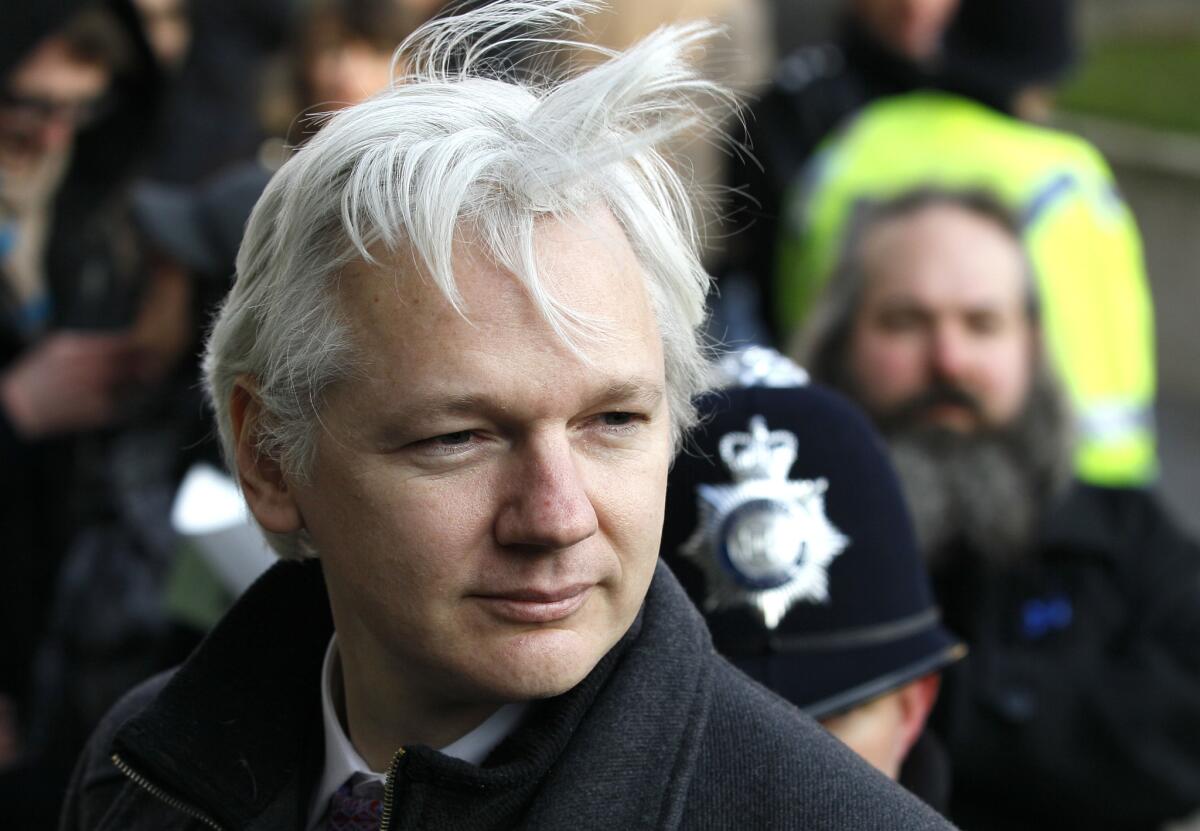Sony Pictures condemns WikiLeaks’ release of hacked material

- Share via
Months after Sony Pictures Entertainment suffered from a crippling cyberattack, troves of the studio’s leaked information has resurfaced on WikiLeaks, potentially reopening one of the darkest chapters in the Culver City studio’s history.
The Julian Assange-run website, known for its massive release of classified U.S. military documents and diplomatic records, on Thursday published a searchable database called “The Sony Archives.”
The public can now easily peruse the data, which includes 30,287 documents from Sony Pictures and 173,132 emails, to and from, more than 2,200 Sony Pictures email addresses.
“This archive shows the inner workings of an influential multinational corporation,” Assange said in a statement on the website. “It is newsworthy and at the centre of a geo-political conflict. It belongs in the public domain. WikiLeaks will ensure it stays there.”
Sony Pictures condemned the WikiLeaks release in a statement, and tried to shoot down Wikileaks’ argument that the documents and emails belong in the public domain, describing the initial cyber attack as “a malicious criminal act.”
“The attackers used the dissemination of stolen information to try to harm SPE and its employees, and now WikiLeaks regrettably is assisting them in that effort,” said a Sony Pictures spokesperson in a statement. “We vehemently disagree with WikiLeaks’ assertion that this material belongs in the public domain and will continue to fight for the safety, security, and privacy of our company and its more than 6,000 employees.”
The studio is exploring legal options but did not give any details about its plans to deal with the WikiLeaks release.
It is newsworthy and at the centre of a geo-political conflict. It belongs in the public domain. WikiLeaks will ensure it stays there.
— WikiLeaks founder Julian Assange, in a statement
Motion Picture Assn. of America Chairman Christopher Dodd also spoke out against WikiLeaks’ decision to release the data, calling it a “despicable act.”
“This information was stolen from Sony Pictures as part of an illegal and unprecedented cyberattack,” he said in a statement. “WikiLeaks is not performing a public service by making this information easily searchable. Instead, with this despicable act, WikiLeaks is further violating the privacy of every person involved.”
U.S. officials confirmed that the North Korean government was behind the attack as retaliation over Sony Pictures’ release of “The Interview,” a comedy starring James Franco and Seth Rogen about a fictional attempt to assassinate North Korean leader Kim Jong Un.
Following hacker threats, Sony yanked the film from theatrical release, but later put it on video-on-demand platforms and in select theaters due to public backlash.
Executives, including Sony Pictures’ former Co-chairman Amy Pascal, came under scrutiny after hackers released confidential emails that contained insensitive remarks about prominent figures in the industry as well as President Obama.
Hackers also leaked digital files that contained confidential information. These files contained about 47,000 Social Security numbers of current or former full-time Sony employees, contractors and actors. Judd Apatow, Sylvester Stallone and Rebel Wilson were among those whose personal information was hacked.
In December, lawyer David Boies, writing on Sony’s behalf to the Los Angeles Times and other news organizations, described the leaked material as “stolen information” and called on media outlets to destroy emails or other Sony documents in their possession.
WikiLeaks archives detail everything from “connections and alignments between Sony Pictures Entertainment and the U.S. Democratic Party” to examples of Sony “collecting ‘intelligence” on rival pictures, such as Oliver Stone’s “Snowden.”
Staff writer Ryan Faughnder contributed to this report.
For more news on the entertainment industry, follow me @saba_h on Twitter
More to Read
From the Oscars to the Emmys.
Get the Envelope newsletter for exclusive awards season coverage, behind-the-scenes stories from the Envelope podcast and columnist Glenn Whipp’s must-read analysis.
You may occasionally receive promotional content from the Los Angeles Times.










